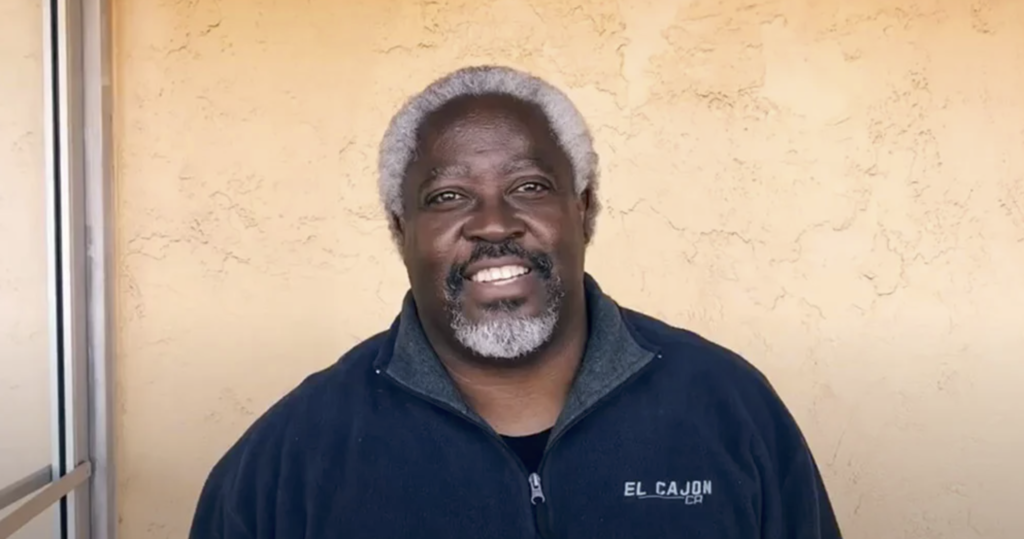
The Rev. Rolland Slade in October 2018. Video screengrab
In his first meeting as leader of the Southern Baptist Convention Executive Committee, the Rev. Rolland Slade called on other committee members on Tuesday (Sept. 22) to be responsible “to shepherd and to protect” survivors of church sex abuse.
Slade, senior pastor of Meridian Baptist Church in El Cajon, California, announced that the issue is “personal” for him because his wife is a survivor.
“For the last 40 years of my life, I have been in touch with a survivor of sexual abuse in the church,” he said to the 70 people attending the virtual meeting. “In fact, we’ve been married 39 years. So when I say it’s personal, it’s personal. And I encourage you to listen. You don’t have to solve it but you need to listen and share with them how much you care and what has happened to them is not what God would have happen in the church.”
Slade was elected in June as the first African American chair of the committee that runs the business of the nation’s largest Protestant denomination between its annual meetings.
The issue of sexual abuse has been a growing focus of the denomination, the country’s second largest Christian group, but has been particularly pressing since a series in the Houston Chronicle last year cataloged some 700 cases of alleged abuse by Southern Baptist pastors and other leaders over two decades. Mike Stone, the committee’s previous chairman, began a meeting of the group last year by displaying a photo of himself as a young child and sharing that he had been abused as a boy.
At the 2019 SBC annual meeting, Southern Baptists approved a new credentials committee that can recommend the disaffiliation of churches that do not properly handle instances of abuse. In February, the Executive Committee removed a Texas church that had employed a pastor who was a registered sex offender.
Jon Wilke, media relations director for the Executive Committee, told Religion News Service before Tuesday’s meeting that the credentials committee “continues to meet virtually and work on churches submitted for disfellowship.” He said the committee will not bring any new recommendations to the full Executive Committee until after it meets in person again, tentatively set for February.
SBC President J.D. Greear, one of the speakers at the Tuesday meeting, echoed Slade’s remarks on supporting abuse survivors as one of the numerous ways the Southern Baptists should focus on describing themselves as “Great Commission Baptists,” a reference to Jesus’ command to spread his message globally that is a theme of the next annual meeting.
“Our focus on the Great Commission is why we will continue to strive to make the most vulnerable in our churches — specifically victims of sexual abuse — feel safe by showing them that we will do everything in our power to keep our churches safe from abuse and safe for the abused,” Greear said.
“That’s not something we do because it’s in the media. It’s not something we do because it’s trendy,” he added.
“We do that because it’s right and because Jesus died for those that were vulnerable and said it’d be better if a millstone were hung about our neck and cast into the sea than to cause one of the little ones to believe and then to stumble.”
Slade listed abuse survivors as the second of two groups he believed his committee should give particular attention. The other is pastors of the relatively small churches that comprise the bulk of congregations affiliated with the evangelical denomination.
“I respect wholeheartedly pastors who have pastored megachurches and have great testimony of the thousands that they reach each and every week,” said Slade. “But I want to remind us that of our denomination of 48,000 churches, there are more churches that are normative size,” he said, referring to churches with Sunday attendance of fewer than 100 people.
Slade offered his own church as an example. “Meridian Baptist Church runs a little over a hundred on a really good Sunday when we count everybody who steps on the property,” he said.
Slade expressed his wish that the men who lead these congregations — often working in additional jobs and giving a portion of their salaries to support the SBC budget — should be connected with megachurch pastors and church planters, who start new congregations.
